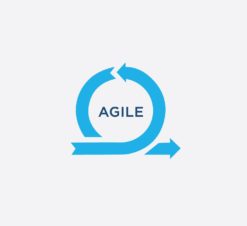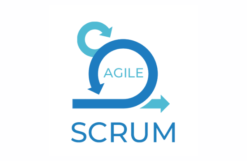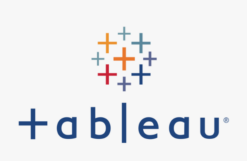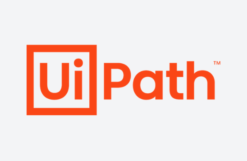Duration: 4 days – 28 hrs
Overview
The “Agile Project Management with Scrum and PSM Certification Review” training course provides a comprehensive and immersive learning experience in Agile project management, with a strong emphasis on the Scrum framework. This course equips participants with the knowledge and skills required to effectively manage and execute Agile projects, from initiation to delivery.
Objectives
- Understand Agile Principles: Comprehend the core principles and values that underpin Agile methodologies and how they differ from traditional project management approaches.
- Master the Scrum Framework: Gain a comprehensive understanding of the Scrum framework, including its roles, events, and artifacts, and learn how to effectively implement it in Agile projects.
- Apply Scrum Practices: Be able to apply Scrum practices in real-world scenarios, including Sprint planning, Daily Stand-ups, Sprint Reviews, Sprint Retrospectives, and Backlog Refinement.
- Adapt Scrum: Learn how to adapt and scale Scrum to suit different project sizes and industries, ensuring its applicability to various contexts.
- Prepare for PSM Certification: Be well-prepared to take the Professional Scrum Master (PSM) certification exam with a solid grasp of key Scrum concepts and practice questions.
- Enhance Agile Project Management Skills: Develop practical Agile project management skills, enabling effective project initiation, planning, tracking, and risk management in Agile environments.
- Utilize Agile Project Management Tools: Explore the use of Agile project management tools and software, and understand how they can enhance collaboration and project visibility.
- Gain Real-World Insights: Hear case studies and success stories from organizations that have successfully embraced Agile and Scrum, learning from their practical experiences.
- Collaboration and Team Empowerment: Understand how Agile and Scrum foster collaboration, transparency, and team empowerment, leading to improved project outcomes.
- Adopt Agile Mindset: Embrace an Agile mindset that emphasizes adaptability, continuous improvement, and customer-centricity in project management.
- Practical Application: Apply the knowledge gained during the course to lead Agile projects effectively, delivering value to stakeholders.
- Customization to Unique Contexts: Be capable of customizing Agile and Scrum practices to suit the unique contexts and challenges of specific projects and industries.
Audience
- Project Managers: Experienced project managers seeking to transition to or enhance their skills in Agile project management using the Scrum framework.
- Scrum Masters: Current or aspiring Scrum Masters aiming to deepen their understanding of Scrum principles and practices and improve their effectiveness in guiding Scrum teams.
- Product Owners: Individuals responsible for product development and ownership who want to collaborate more effectively with Scrum teams and understand Agile project management.
- Developers: Software developers and engineers looking to understand the Agile project management approach and how it affects their roles within development teams.
- Quality Assurance (QA) Professionals: QA professionals interested in Agile testing practices and how they integrate into Scrum projects.
- Team Leaders: Leaders of cross-functional teams who want to improve their team’s performance and collaboration using Agile principles and Scrum practices.
- Business Analysts: Professionals responsible for gathering and analyzing project requirements who want to align their practices with Agile methodologies.
- IT Professionals: IT professionals involved in project management, development, or software delivery who want to adopt Agile practices and Scrum in their work.
- Professionals in Transition: Individuals looking to transition to Agile project management roles or explore opportunities in the Agile and Scrum space.
- Anyone Interested in Agile: Individuals who have a general interest in Agile methodologies and want to gain a deeper understanding of Agile project management and Scrum practices.
Pre- requisites
- Basic Project Management Knowledge: Participants should have a fundamental understanding of project management concepts and practices. This includes knowledge of project initiation, planning, execution, monitoring, and closure.
- Familiarity with Agile Concepts: While not mandatory, having some prior knowledge or exposure to Agile methodologies and principles can be beneficial. This could include familiarity with the Agile Manifesto and its values.
- Work Experience: It’s advisable for participants to have some work experience in a project management or related role. This experience helps contextualize the Agile and Scrum concepts covered in the course.
- Basic Computer Skills: Participants should be comfortable using computers, as the course may involve using Agile project management tools and software for practical exercises.
- Willingness to Learn: An open mindset and a willingness to embrace Agile principles and Scrum practices are essential prerequisites. Participants should be eager to adapt to a different project management approach.
Course Content
Agile
- 4th Industrial Revolution
- Business Agility
- Agile Overview
- Agile Manifesto
- Agile Values
- Agile Principles
- Agile vs. Waterfall
- Agile Mindset
Scrum
- Scrum Overview
- Scrum Values
- Scrum Pillars
- Scrum Roles
- Scrum Events
- Scrum Artifacts
Pre-Sprint
- Product Vision Board
- User Persona
- User Journey
- User Story Mapping
Building the Product Backlog
- The Product Backlog Items
- Epic
- Features
- User Story
- User Story Mapping
- Definition of Ready
- Definition of Done
- User Story Writing
- From Epic to User Story
- Writing User Stories
- Acceptance Criteria
Product Backlog Refinement
- Estimation
- Prioritization
- Ordering
- Release Planning
Implementing Scrum
- Sprint
- Sprint Planning
- Presentation
- Discussion
- Estimation
- Commitment
- Sprint Backlog
- Daily Scrum/Standup Meeting
- Did Yesterday
- Do Today
- Impediments
- BONUS: 16th Minute
- Sprint Review and Demo
- Presentation of Increment
- Inspection of Increment
- Adaptation of Product Backlog
- Sprint Retrospective
- Went Well
- Needs Improvement
- Action Items
- Mid-Sprint Refinement (Optional Event)
- Next Sprint
- READY User Stories
- Release Plan Refinement
- Schedule of Release
Professional Scrum Master Certification Review
- Guidelines
- Exam Tips
- Mock Exam












